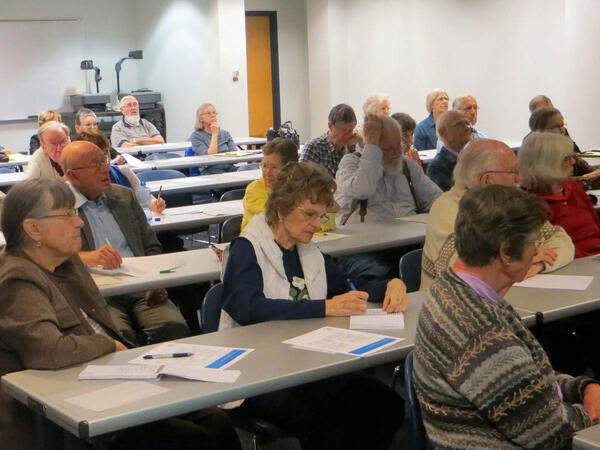
Event report
March 2015 - Taxing Matters: Strategies for Effective Estate Tax Planning Seminar
The final seminar for the year was held on March 19th. The seminar, Taxing Matters – strategies for effective estate and tax planning, was given by Christine Kolm, Director Wealth Planning Strategies, TIAA CREF. Something over 40 were in attendance. Following is a cliff notes version of the talk; if you want you can review the presentation slides by clicking on seminar slides.
Christine began with a disclaimer: the material is for educational benefit only and should not be relied on as tax or legal advice. She then moved on with an overview of the presentation and right into the first topic.
Income tax planning
Christine reviewed with examples the variety of taxes that come into play, including taxes associated with the Patient Protections and Affordable Care Act, the American Taxpayer Relief Act of 2012, unearned income, personal exemptions, and the 2015 tax brackets.
Estate tax planning and considerations
The talk gave a quick overview of estate taxes and then discussed at length the impact of portability1. The current federal estate tax exemption is $5,430,000 per taxpayer. While portability simplifies planning and provides flexibility for married couples there are some caveats – remarrying may impact portability.
Basic estate planning considerations.
The final part of the seminar addressed planning for incapacity:
- what would happen to you and/or your assets,
- medical matters
- money matters
Christine reviewed a number of documents that everyone should consider.
At the conclusion of the talk Christine took a number of questions from the audience. The evaluations completed by the seminar participants indicated that they found the seminar very valuable and helpful.
We wish to thank Nestor Montoya, Christine Kolm and TIAA-CREF for putting on this seminar for us.
Story by Barry McNeill & Gary Kleemann; Photos by Gary Kleemann
1“In simple terms, portability of the federal estate tax exemption between married couples means that if the first spouse dies and the value of the estate does not require the use all of the deceased spouse's federal exemption from estate taxes, then the amount of the exemption that was not used for the deceased spouse's estate may be transferred to the surviving spouse's exemption so that he or she can use the deceased spouse's unused exemption plus his or her own exemption when the surviving spouse later dies” (taken from http://wills.about.com/od/understandingestatetaxes/qt/What-Is-Portability-Of-The-Estate-Tax-Exemption.htm).
ASU Retirees Association
